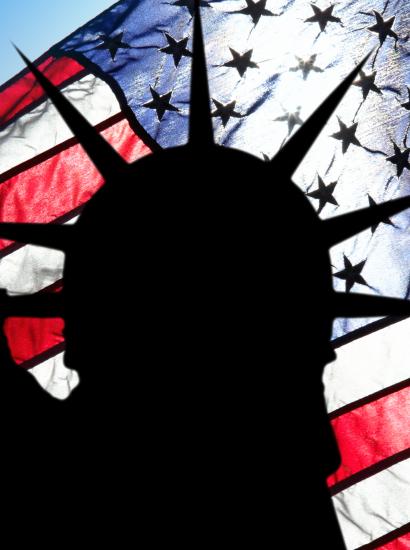- Law & Policy
- Immigration
- Politics, Institutions, and Public Opinion
- State & Local
- California
Over the course of a rather eventful March in California—more COVID vaccinations are on the way as eligibility expands, we’ve been promised; the two Los Angeles universities went further than expected in the NCAA men’s basketball tournament—here’s something you might have missed: the 87th birthday of Willie Brown, aka “the ayatollah of the Assembly” for his one-man domination of the State Assembly as that chamber’s Speaker for two decades, ending in the mid-1990s.
Not that the milestone went entirely unnoticed: March 22 was officially “Willie Brown Day” in Oakland. Apropos of a politician known for high-end living coupled with a pursuit of money, the day was stylish and dollar driven. Brown arrived in a 1927 royal purple Packard for a ceremony at the 12-story Bechtel Building, which faces the city’s Lake Merritt—and not coincidentally, is his family’s residence and where the former Speaker was shooting a promotional real estate video.
Willie Brown now belongs to an exclusive club of prominent California lawmakers still serving or retired. Let’s call it “the 87 club” —two Democrats and a Republican all in their 87th year on the planet.
The other members: Sen. Dianne Feinstein, like Brown a former mayor of San Francisco (she turns 88 on June 22); and former governor Pete Wilson, a Republican who served with Brown in the State Assembly in the late 1960s, then sparred with Brown when Wilson returned to the state capitol as California’s chief executive in the early 1990s (his 88th birthday is two months and one day after Feinstein’s).
Before I explain the significance of these three “87-ers,” a word about coincidental birthdays. It’s also happened at the presidential level. Bill Clinton, George W. Bush, and Donald Trump were born in a nine-week stretch in the summer of 1946—with not much in common other than the one honorific and Ivy League educations.
What do Brown, Feinstein, and Wilson have in common? Chiefly, this: if each attempted their political climbs, they’d be hard-pressed to repeat their success in today’s California.
I’d argue that’s especially true of Feinstein, as of last weekend California’s longest-serving US senator. She became a force in statewide politics beginning in 1990, when she told a convention audience of California Democrats that her party was out of step with public sentiment regarding capital punishment (running for a fifth and perhaps final Senate term in 2018, a more woke Feinstein characterized the death penalty as “applied arbitrarily or discriminatorily on the basis of race, gender and geography”).
Wilson’s challenge: maybe not so much climbing the ladder in California (he did win two Senate and two gubernatorial races in a twelve-year span from 1982 to 1994) as it would be taking the next step, to a national office, which he attempted when he briefly ran for president in 1995.
The obstacle? Wilson is pro-choice. Though he tried and failed to soften the party’s platform language on that topic at the 1996 Republican National Convention, today’s Republican Party remains decidedly anti-abortion when it puts on national shows.
As for Brown, his problem would be one of style. Though derided by his foes for ruling with an iron fist in Sacramento (Brown’s lengthy speakership was a talking point for the proponents of 1990’s Proposition 140, which imposed term limits on California state lawmakers), the “ayatollah” was not averse to compromise with the nonbelievers when need be—one example being the state budget deal he struck with Wilson in 1991 in which the Speaker agreed to spending cuts while giving in to the governor and going with less draconian tax increases than Democratic lawmakers would have preferred.
Something else Brown would suffer for in today’s walk-on-eggshells approach to dealing with his party’s angry base: candor—at least, the openness he displayed when he left public office. Good luck getting far in today’s Democratic Party when you criticize burning and looting in the name of justice, impeaching Donald Trump, or having a Democratic alternative on the ballot should a gubernatorial recall election occur later this year in the Golden State.
Such realpolitik is lacking in the California at present—at least, I believe it is so among the current trio of state lawmakers with an “87-er”-like ability to have a long-term impact on the Golden State (for argument’s sake, I’m not including Nancy Pelosi, reportedly in her final term as House Speaker).
That trio: Vice President Kamala Harris, Gov. Gavin Newsom, and US Senator Alex Padilla—varying in age from 48 (Padilla) to 56 (Harris), meaning all are in essence Gen Xers.
Newsom’s challenges we’ve covered repeatedly in this space. But if the goal is to find evidence of realpolitik—i.e., a willingness to look past his base to consider what’s best for the state—look no further than the folly of the governor’s now dissolved economic recovery task force: seven months of Zoom calls that produced such sophisticated thoughts as “close the digital divide” and “incorporate equity and sustainability.”
As for Harris and Padilla, one issue comes to mind: immigration.
The vice president is now officially the Biden administration’s point person on immigration policy as the White House copes with the present border surge. Yet Harris has indicated that she won’t visit the US-Mexico border in the near future. In the spirit of the middle ground, one might think a firsthand view of the situation and a sit-down with US Border Patrol could prove to be enlightening.
Padilla’s position is different, in that he doesn’t have the same designated role as Harris, whose former Senate seat he now occupies, but as California’s first Latino senator and representing the state that’s home to roughly one-fourth of America’s undocumented population, he has a choice in terms of participating in the immigration debate: lip service or agent of change.
Padilla has shown he can sermonize on the Senate floor—for example, his maiden speech, in which he lamented the present state of the Golden State (“We see . . . two Californias in the impact the pandemic has had on the immigrant community, the very community on the front line of this crisis”).
But can Padilla get anything done?
California’s freshman senator chairs a subcommittee that’s the first step in the chamber eventually producing a reform bill (Padilla retitled that panel “Immigration, Citizenship, and Border Safety”). He’s also one of a group of Democratic members of Congress sponsoring the Citizenship for Essential Workers Act, which would provide a pathway to citizenship for roughly five million undocumented workers.
In a Congress where the last run at immigration reform nearly a decade ago included a bipartisan Senate “gang of eight”, the 2021 approach so far is anything but conciliatory—not when the other senator involved in the rollout of the pathway legislation is Elizabeth Warren.
Does Padilla attempt to bring any Republicans on board in this year’s immigration push (with Florida senator Marco Rubio, a “gang of eight” veteran, seemingly a logical starting point)?
Or does he take part in a bruising partisan exercise that likely would require amending (if not ending) the Senate’s filibuster tradition in order to an end an impasse over who deserves a shot at citizenship?
Here’s a suggestion for California’s junior senator: set up a conference call with Brown, Feinstein, and Wilson (yes, the former governor supported Proposition 187, but he also happened to be a US senator the last time a significant immigration overhaul was accomplished) and ask how they’d proceed.
Or does pragmatism not matter anymore?
















